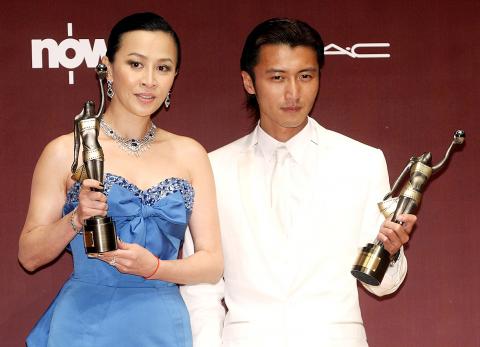Veteran Hong Kong director Tsui Hark’s (徐克) murder mystery Detective Dee and the Mystery of the Phantom Flame (通天神探狄仁傑) was the biggest winner at the 30th Hong Kong Film Awards on Sunday.
The Tang Dynasty drama featuring famous Chinese detective Di Renjie scooped six awards, including best director, best actress, best art direction, best sound design, best visual effects and best costume and make-up design.
“The whole team has worked really hard and put in a lot of effort to make this a spectacular production,” Tsui said after receiving the award. “This award is to be shared with everyone involved.”

Photo: AFP
The moviemaker’s latest hit was nominated for the top Golden Lion Award at the Venice Film Festival last year.
Carina Lau (劉嘉玲), crowned best actress for her role as the powerful Chinese empress Wu Zetian (武則天) in Tsui’s drama, said: “After being nominated so many times and not winning, I didn’t think it would really happen to me.”
She beat fellow contenders Miriam Yeung (楊千嬅), Fiona Sit (薛凱琪), Tang Wei (湯唯), and Josie Ho (何超儀), daughter of Macau casino magnate Stanley Ho (何鴻燊).
Gallants (打擂臺), a rollicking homage to Hong Kong kung fu movies in the 1970s, was the dark horse of the night and the second biggest winner, scooping awards for best film, best supporting actor, best supporting actress and best original film score.
Long-time actor-director-singer Teddy Robin (關維鵬) bagged the honors for best supporting actor for his role in the comedy.
“Over the past 30 years, I’ve had a lot of nominations, but not wins. This time round, it’s finally my turn,” he told reporters.
“This is an affirmation that I am a good actor too,” he added.
Best actor went to singer-cum-actor Nicholas Tse (謝霆鋒) for his role in the gritty action-packed cop drama The Stool Pigeon (線人), beating early favorite and veteran actor Chow Yun-fat (周潤發) as the great Chinese thinker Confucius.
Prolific filmmaker Pang Ho-cheung (彭浩翔) and Heiward Mak (麥曦茵) won the award for best screenplay for the light-hearted romantic film Love in a Puff (志明與春嬌), a movie about a cosmetics saleswoman who develops a romance with a fellow smoker.
Oscar-winning director of photography Peter Pau (鮑德熹) bagged the honors for best cinematography for his work in Confucius (孔子: 決戰春秋), a biopic that follows the life of the legendary Chinese philosopher, tracing his journey around small kingdoms in China preaching his beliefs.
“I was deeply influenced by Chow Yun-fat during this movie,” Pau said while receiving the award on stage. “He embodies the very values Confucius teaches and is a very dedicated actor.”
Rising star Hanjin Tan (陳奐仁) was named best new performer for his role in the biopic Bruce Lee, My Brother (李小龍), which tells the story of martial arts legend Bruce Lee (李小龍) in his youth, while Felix Chong (莊文強) took home best new director.
Best Asian film went to the Japanese thriller Confessions.
The award for best film editing went to Cheung Ka-fai (張嘉輝), who worked on Ip Man 2 (葉問2), a sequel to the 2008 film on the life of the legendary kung-fu master starring Donnie Yen (甄子丹).
Together with Taiwan’s Golden Horse Awards, the Hong Kong Film Awards ceremony is one of the Chinese film industry’s most prestigious events, as the southern Chinese city remains a rich source of film talent.
Its stars still enjoy huge popularity across Asia. There have been increasing collaborations between Hong Kong and Chinese filmmakers in recent years targeting the large market of moviegoers in China.

Google unveiled an artificial intelligence tool Wednesday that its scientists said would help unravel the mysteries of the human genome — and could one day lead to new treatments for diseases. The deep learning model AlphaGenome was hailed by outside researchers as a “breakthrough” that would let scientists study and even simulate the roots of difficult-to-treat genetic diseases. While the first complete map of the human genome in 2003 “gave us the book of life, reading it remained a challenge,” Pushmeet Kohli, vice president of research at Google DeepMind, told journalists. “We have the text,” he said, which is a sequence of

On a harsh winter afternoon last month, 2,000 protesters marched and chanted slogans such as “CCP out” and “Korea for Koreans” in Seoul’s popular Gangnam District. Participants — mostly students — wore caps printed with the Chinese characters for “exterminate communism” (滅共) and held banners reading “Heaven will destroy the Chinese Communist Party” (天滅中共). During the march, Park Jun-young, the leader of the protest organizer “Free University,” a conservative youth movement, who was on a hunger strike, collapsed after delivering a speech in sub-zero temperatures and was later hospitalized. Several protesters shaved their heads at the end of the demonstration. A

Every now and then, even hardcore hikers like to sleep in, leave the heavy gear at home and just enjoy a relaxed half-day stroll in the mountains: no cold, no steep uphills, no pressure to walk a certain distance in a day. In the winter, the mild climate and lower elevations of the forests in Taiwan’s far south offer a number of easy escapes like this. A prime example is the river above Mudan Reservoir (牡丹水庫): with shallow water, gentle current, abundant wildlife and a complete lack of tourists, this walk is accessible to nearly everyone but still feels quite remote.

In August of 1949 American journalist Darrell Berrigan toured occupied Formosa and on Aug. 13 published “Should We Grab Formosa?” in the Saturday Evening Post. Berrigan, cataloguing the numerous horrors of corruption and looting the occupying Republic of China (ROC) was inflicting on the locals, advocated outright annexation of Taiwan by the US. He contended the islanders would welcome that. Berrigan also observed that the islanders were planning another revolt, and wrote of their “island nationalism.” The US position on Taiwan was well known there, and islanders, he said, had told him of US official statements that Taiwan had not